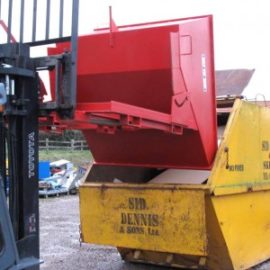
5 Top Tips to buying the right recycling skip
Top 5 tips to specifying a waste collection/recycling skip, by Gavin Barnes, recycling projects engineer, Tong Engineering
With figures from the Health and Safety Executive (HSE) highlighting that there are at least 35,000 slips, trips and falls in the workplace each year, equating to over £512 million per year in lost production and other costs, it is now more important than ever to ensure that the workplace is clean and tidy to help prevent injury and meet health and safety standards.
Gavin Barnes, recycling projects engineer at Tong Engineering, gives his tips for what to look for when investing in self tip skips as a solution to keeping your premises clean and tidy in a simple and economical way.
Skip Tip 1: Safety
If you are frequently handling high volumes of heavy, bulk material, ensure you select a recycling skip which has in-built safety measures. When purchasing a self tipping skip be sure to look for one which operates with single-lever action and ideally automatic return which helps to not only ensure minimal contact with the full skip, but also significantly increases emptying speed and efficiency. If your workplace is multi-level or you intend to use the recycling skip to fill larger waste skips and big bag filling bins, think about selecting a skip which can either be customised to work at height or can be easily lifted with a forklift.
Skip Tip 2: Quality
Investing in robust, reliable and high quality equipment will not only ensure longevity, but also improve long-term cost efficiency. Long-lasting, weather resistant recycling skips rely on both quality fabrication and reliable tipping mechanisms, so when specifying, make sure you consider the lifting mechanisms, fabrication quality and finishing carefully. Added features such as 3-way entry can also offer added value and versatility of use and should definitely be considered when buying a quality self-tipping skip.
Purchasing from a well established manufacturer can help to ensure that you are getting a quality product which is fit for purpose.
Skip Tip 3: Maintenance
Simple and minimal maintenance are both key factors in the efficiency of recycling lines as well as waste handling and movement. Complex tipping skips and systems often require more specialist maintenance and attention, while simple mechanisms will increase lifespan, but may not offer the highest levels of throughput. If you require repetitive tipping or feeding of hoppers or larger waste recycling skips and bins, it may be worthwhile considering automated box or bag tipping systems which can offer significant savings of time and labour. Nonetheless, self tipping skips offer a simple, economical and versatile way of keeping your premises tidy with minimal maintenance. Try to match design to purpose, and balance efficiency with productivity, to ensure you specify the right tipping skip.
Skip Tip 4: Bespoke Design
Recycling skips come in all shapes and sixes, so make sure that whichever you select is right for you and your setting.
Remember that different materials often require different types of recycling skip, i.e. if you are handling corrosive materials ensure you have a stainless steel skip to avoid corrosion and premature rusting of the skip. It is also important to bear in mind the weight and nature of the materials you are handling; if you are processing heavier materials, be sure to specify a heavy-duty skip which will be designed and fabricated for that specification.
Balance size and cost and think carefully about a) what you need it for, b) what product or material will be in the skip and c) if you have any size or space limitations?
Skip Tip 5: Space Requirements
Skips can be small, handy and easily manoeuvrable, meaning they are perfect for factory or warehouse environments. At Tong Engineering, we are finding that people tend to have several recycling skips in a workspace which can easily be lifted by a forklift and emptied into bigger skips or bins which are located elsewhere on site.
Although there is only a marginal difference in the cost of higher capacity skips, it is important to keep space saving in mind when making your choice. The size and maximum load of your forklift is also an important consideration, as you need to be sure that your forklift can lift the intended load.
If your organisation is processing or sorting light materials, such as paper or cardboard, it might be worth considering a mesh extension to the top of the recycling skip, which allows increased capacity without compromising space or a great amount of weight. On the other hand if you are processing heavy materials, such as brick or scrap metal, it would be worth investing in a skip with the largest capacity that your forklift can manage.
Share this post